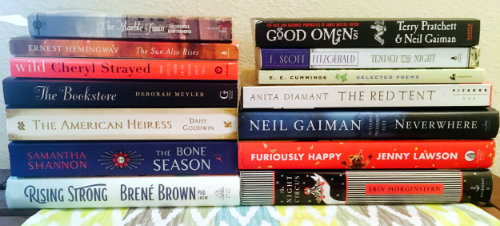My “To Be Read” pile has grown alarmingly since I joined the Book Publishing program and Ooligan Press. Between the required reading, the recommended reading (that is really more required than not), and my fun reading, I really don’t have the time to reread anything. Rereading a book is a guilty pleasure that I cannot bring myself to feel guilty for indulging. And oh boy, do I indulge it. I reread a book just about every other time I pick one up. Beyond finding familiar stories comforting, I think rereading is a valuable habit that lets you really understand what a story means to you personally.
For me, rereading a book is a comforting ritual that allows me to revisit favorite places, characters, and events, much like drinking the same wine you had on vacation can transport you back to that spot on the beach or café in Paris. More than that, a book I want to reread signals that the story is worth revisiting; a book I reread is a book I will recommend to a friend. Rereading is also a way I can benchmark my personal growth. Since stories change as you change, I can look back at the impact a YA love scene had on me at seventeen with an appreciation for those feelings and joy that I experienced, as I’ve grown past the angst involved in young love over the last decade. Moments in a story that I skimmed through in previous readings I can examine again and appreciate differently. While the books in my rotation change with time, one novel I read again and again is Neil Gaiman’s Neverwhere, a story I’ve been rereading for nearly a decade now. I’ve read it so often I know the story by heart, but it never fails to offer up some morsel that surprises or delights me in a new way. My favorite characters change, my favorite scenes change, but my delight in the story each and every time I reread it does not change. I can count on Neverwhere in the same way you can count on chicken noodle soup when you’re sick.
With a new book, you are driven by the plot. You aren’t in control of the pace—the author is. When you reread a book, you’re in charge. You can speed up or slow down and pay closer attention to the emotions and development of the characters as an observer and not as a participant. In a rereading, your understanding of events in the story are influenced by the past and future events of the story. One of my favorite things about rereading is that I get to be omniscient—take that, reality! I like rereading books because I know what is going to happen, and I like comparing my initial reaction to the story’s events to my subsequent reactions. Jumping into a story I know allows me to plant myself even more firmly into the story; it enriches the actions and emotions of the characters because I’m feeding my knowledge and experiences into the reading.
Of course, rereading has its detractors: That small population of people who claim, among other reasons, that rereading is a waste of time when there are so many other books you need to discover. Or that to reread a book means you were too slow to understand it the first time. (And if you’re one of those people who understands everything the first time, I envy your brain!) Even worse, if they imply that your taste in books is too narrow just because you reread your favorites constantly. I encourage you to ignore those critics and read—or reread—exactly as you choose. In my admittedly biased opinion, the only bad reader is someone who doesn’t read at all.

